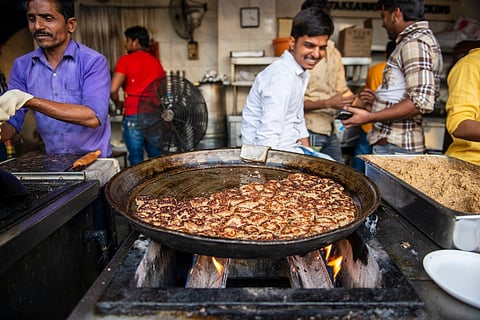
- Destinations
- Experiences
- Stay
- What's new
- Editor’s Picks
- Responsible Tourism
- CampaignsCampaigns
- Subscribe

When one thinks of the city of Lucknow, one can't help but think about its mouth-watering delicacies. Nihari-kulcha, khasta kachori, tundey and galawati kebabs are just a few dishes that come to mind.
Of these, perhaps it is the galawati that has made its presence felt across India in eateries of all kinds.
But did you know the famous (perhaps world-famous) galawati kebabs have a fascinating history
A Kebab For The Ageing Nawab
Galawati translates to 'that which melts in the mouth'. It is no wonder that when you take a bite of the kebab, it melts in your mouth, literally Historically, it was custom-made for the ageing Nawab of Lucknow, Wajid Ali Shah, who is believed to have loved his kebabs. His admiration for the dish was so much so that when he began ageing and losing his teeth, he ordered the chefs, or khansamas, to experiment with different styles of cooking kebabs and come up with something that would allow him to chew meat easily. The Nawab lost his tooth but not his love for kebabs.
His khansamas came up with the galawati kebab - which is ground meat (chicken or lamb) mixed with various spices. This dish contains unripe papaya paste to break down the fibre of the meat. It is often eaten with freshly made parathas or biryani.
Keeping Up With Royalty And Legacies
"Galawati kebab ek nazakat hua karti thi hum nawabo mei", says chef Sima Ahmed who has her ancestral roots in Uttar Pradesh's Faizabad (the ancient capital of Awadh) but moved to Kolkata in West Bengal after her marriage. She now conducts pop-up exhibitions where she exhibits her mouth-watering, homemade Awadhi delicacies. Her pop-ups are often known as Kolkata's best-kept culinary secret. Her recipes have been passed down for generations.
She says, dismissing any myths, "Awadhi food is generally confused for Mughlai food. They are not the same. There is a stark difference in how it is prepared. The former is cooked in mustard oil or sarson tel the latter is made in pure ghee".
How can one speak of Lucknow and not mention biryani Ahmed says, "In Awadhi cuisine, or at marriages, serving aloo can put a guest's mood off or lead them to assume that potatoes are replaced for meat because the hosts couldn't afford to feed them enough meat. In Kolkata, biryani is made with aloo, but I always check with my customers if they want aloo in it or not, because some people are not big fans of potatoes in their biryani."
Of Nazakat and Nafasat
Whenever she talks about kebabs, author Rana Safvi often refers to these lines written by Lucknow's famous poet Ghulam Hamadan Mushafi. Sar e atish jo ashk rezaan thaa, kisi aashiq ki thi kabab mein jaan
(No doubt this kebab has a lover's mind. Fire and tears together, where else would you find)
"Awadh is the land of sangam, where the rivers Ganga and Jamuna meet it is also here where it gets the unique Ganga-Jamuni identity," she says. "The cuisine in this region reflects the amalgamation of Persian influences that came with the Nawabs of Iran, which mixed with the existing culture of this rich Indo-Gangetic plain. For instance, the kebab was eaten with a parantha &mdash inspired by fried puris, an intrinsic part of Hindu cuisine. Even today, if you visit the narrow galis of old Lucknow, you will find puri-kebab and puri-aloo ki sabzi being sold, along with samosa and jalebi. Galawati kabab, as the name implies, is made of very tender meat and is not easy to make. It takes experience to know how much galawat to use. Too little and it doesn't become tender. Too much, and it disintegrates. It needs just the correct amount of spice to embellish the kabab's taste and not overpower it. That's why Awadhi cuisine is famed for the nazakat and nafasat of its cuisine."
